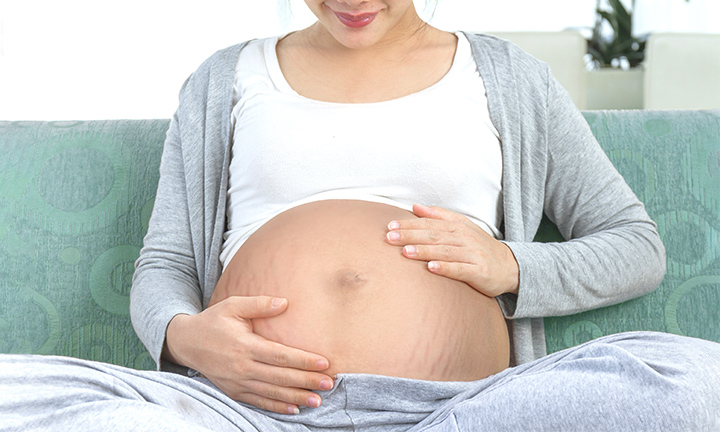
Hyperemesis Gravidarum: Severe Nausea During Pregnancy
Feeling sick or vomiting during early pregnancy – sometimes known as ‘morning sickness’ – is common, but some mums-to-be experience a far more severe form of nausea known as hyperemesis gravidarum. Read on to learn more about this condition, how the symptoms of hyperemesis gravidarum differ from those of regular morning sickness and what treatments are available to ease the discomfort.
What Is Hyperemesis Gravidarum?
Around 8 out of 10 mums-to-be experience a certain amount of queasiness, nausea or vomiting during the early stage of pregnancy. This is a common pregnancy symptom known as ‘morning sickness’ (although it can strike at any time of day, not just in the morning). Regular morning sickness can be challenging enough at times, but for an unlucky few (an estimated 1 to 3 out of every 100 mums-to-be) the symptoms are much more severe.
This kind of extreme pregnancy sickness is known as hyperemesis gravidarum (HG), and it may need special treatment.
Besides being more intense, hyperemesis gravidarum can sometimes (but not always) be longer-lasting than regular morning sickness meaning it may last into the second trimester where regular morning sickness tends to subside after the first trimester.
Can Hyperemesis Gravidarum Affect You and Your Baby?
Hyperemesis gravidarum probably won’t affect the development of your foetus as long as you get the right treatment. It’s important to see your doctor if you have severe vomiting in pregnancy because if it isn’t managed properly, hyperemesis gravidarum could lead to complications like dehydration or weight loss which can affect both you and the foetus. Your doctor will also rule out any other condition – such as a urinary tract infection – that might be causing the excess vomiting. Apart from the physical discomfort, hyperemesis gravidarum can also be emotionally draining, preventing you from enjoying your pregnancy as much as you might have hoped. Early and effective treatment may help improve your quality of life and allow you to focus more on the positive aspects of being pregnant.
Symptoms of Hyperemesis Gravidarum
The main symptom of hyperemesis gravidarum is prolonged, severe nausea and vomiting during pregnancy, which usually starts any time between 4 and 12 weeks of pregnancy. Other symptoms reported by many mums-to-be with HG can include
Excess vomiting in pregnancy can have other consequences that your doctor or midwife need to know about straight away, including:
Causes and Risk Factors
The causes of hyperemesis gravidarum – and the reasons why some mums-to-be get it while others don’t – are not fully understood. However, experts believe it may be linked to hormonal changes during pregnancy. It’s thought that HG may run in families, so if your mother or a sister – for example – has experienced severe nausea during a pregnancy, it’s possible that you will, too. There’s also a higher chance of HG occurring again if you had it in an earlier pregnancy. Talk to your doctor or midwife about how you can best prepare if you think you may be at a higher risk of hyperemesis gravidarum.
When to See the Doctor
You might be wondering whether what you’re experiencing is ‘only’ regular morning sickness or if it’s serious enough to be considered hyperemesis gravidarum. Both conditions can feel unpleasant, so it can be difficult to subjectively define the level of discomfort at which you can say your symptoms feel ‘much worse’ than the usual queasiness experienced by the majority of mums-to-be. Only your doctor can diagnose hyperemesis gravidarum, but as a general rule call your midwife or doctor or visit the hospital if any of the following apply to you:
Hyperemesis Gravidarum Treatment and Prevention
Unfortunately, there are no sure-fire ways to prevent hyperemesis gravidarum. Some of the home remedies recommended for acute morning sickness may help a little, such as
However, if you have severe nausea and vomiting these home remedies alone might not be effective and your doctor may recommend further medical treatment, including one or a combination of the following:
Your Emotional Wellbeing
If you have acute morning sickness or hyperemesis gravidarum you might experience feelings of isolation or anxiety, for example not wanting to leave home for fear of vomiting. You may also be uncertain or worried about how you’ll cope with the other aspects of pregnancy. These thoughts and feelings could increase your risk of depression during pregnancy or postnatal depression after your little one is born, especially if you suffer in silence. This is why it’s better to talk them through with somebody you trust, like your partner, a friend or family member, or a professional. If you feel there’s nobody you can talk to, or that the people around you can’t relate to what you’re going through, your midwife or doctor can put you in touch with support groups for mums-to-be with hyperemesis gravidarum. The important thing to know is that you’re not alone and help and support is available.
FREQUENTLY ASKED QUESTIONS
Nobody knows exactly what causes severe nausea and vomiting during pregnancy, but experts believe it might be linked to hormonal changes that occur when you’re pregnant.
The Bottom Line
Having hyperemesis gravidarum is tough, no doubt about it, but your midwife and doctor can offer you treatment options and other kinds of support that will make it easier to get through this difficult patch. With a bit of luck, the second trimester could also bring some respite. But even if some of the symptoms do linger on after that, try to keep in mind that it won’t last forever. Once your little one is born the feelings of sickness will quickly fade into memory as you finally get to cradle your newborn baby in your arms.
The information in this article is based on the expert advice found in trusted medical and government sources, such as the National Health Service (NHS). You can find a full list of sources used for this article below. The content on this page should not replace professional medical advice. Always consult medical professionals for full diagnosis and treatment.
Read more about Pregnancy
Related Articles
Join Pampers Club and get:














